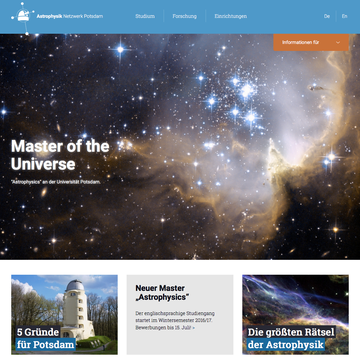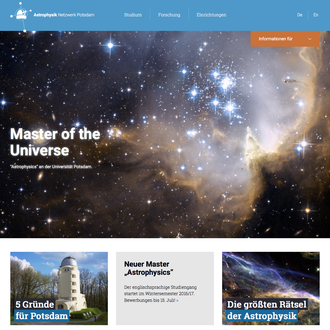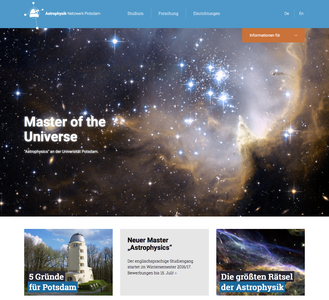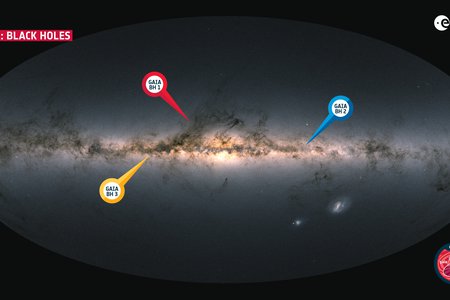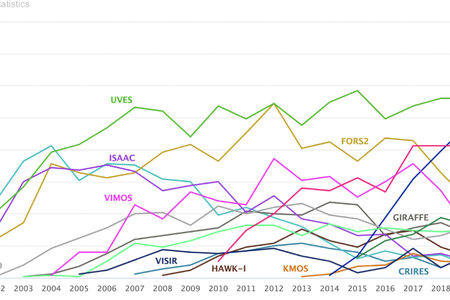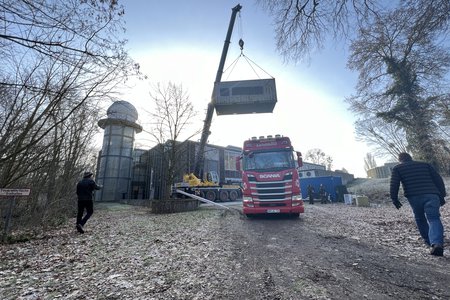New Master's programme in „Astrophysics“
The Deutsches Elektronen-Synchrotron DESY, the Leibniz Institute for Astrophysics Potsdam (AIP) and the Max Planck Institute for Gravitational Physics significantly contribute to this new curriculum. Students interested in a career in Astrophysics should apply not later than July 15. Only three universities in Germany afford students the possibility to achieve a Master’s degree in Astrophysics.
In Potsdam, students and researchers can take advantage of a unique and broad range of astrophysical topics. Furthermore, Astrophysics research being carried out at the University of Potsdam stands out due to strong networks with non-university research institutions specializing in astrophysical topics. These three internationally leading institutions make Potsdam one of the major sites of astrophysical research in Germany. Joint professorships, associate and honorary professorships and joint research groups strengthen academic teaching at the University. An overarching structured doctoral training and joint graduate schools provide an excellent environment to PhD students.
The University of Potsdam and the non-university partner institutions have also used the start of the new Master’s program as an opportunity to initiate a new Astrophysics website: The manifold of activities and their close collaboration in research and education is now online in the common framework of the ”Astrophysics Network Potsdam“.
In addition to a wealth of information for students and researchers at all stages of their careers, the new website also contains insights into some personal impressions and experiences of Potsdam’s scientists: on their scientific discoveries, on the Potsdam student and researcher life and on observation campaigns in remote locations such as Chile or even the Antarctic.
„When any prospective student or young researcher visits the website, we want her or him to recognize immediately the unique study and career opportunities that our strong network offers here in Potsdam.“ said Philipp Richter, professor at the University of Potsdam and one of the initiators of the new website.
More information:
- Website Astrophysics Network Potsdam: http://www.astrophysik-potsdam.de/en
- New Master’s programme in „Astrophysics“: http://www.astrophysik-potsdam.de/en/studies/master-science-astrophysics
Contact person (also for the Master’s programme):
Professor Dr. Philipp Richter, Email: prichter@astro.uni-potsdam.de, Phone: +49 331 977-1841
Contact persons for journalists:
- Deutsches Elektronen-Synchrotron, Zeuthen: Ulrike Behrens, Email: ulrike.behrens@desy.de, Phone: +49 33762 7-7201
- Leibniz Institute for Astrophysics Potsdam: Dr. Janine Fohlmeister, Email: presse@aip.de, Phone: +49 331 7499-802
- Max Planck Institute for Gravitational Physics: Dr. Elke Müller, Email: elke.mueller@aei.mpg.de, Phone: +49 331 567-7303
- University of Potsdam, Faculty of Science: Dr. Barbara Eckardt, Email: eckardt@uni-potsdam.de, Phone: +49 331 977-2964
The Deutsches Elektronen-Synchrotron DESY, the Leibniz Institute for Astrophysics Potsdam (AIP) and the Max Planck Institute for Gravitational Physics significantly contribute to this new curriculum. Students interested in a career in Astrophysics should apply not later than July 15. Only three universities in Germany afford students the possibility to achieve a Master’s degree in Astrophysics.
In Potsdam, students and researchers can take advantage of a unique and broad range of astrophysical topics. Furthermore, Astrophysics research being carried out at the University of Potsdam stands out due to strong networks with non-university research institutions specializing in astrophysical topics. These three internationally leading institutions make Potsdam one of the major sites of astrophysical research in Germany. Joint professorships, associate and honorary professorships and joint research groups strengthen academic teaching at the University. An overarching structured doctoral training and joint graduate schools provide an excellent environment to PhD students.
The University of Potsdam and the non-university partner institutions have also used the start of the new Master’s program as an opportunity to initiate a new Astrophysics website: The manifold of activities and their close collaboration in research and education is now online in the common framework of the ”Astrophysics Network Potsdam“.
In addition to a wealth of information for students and researchers at all stages of their careers, the new website also contains insights into some personal impressions and experiences of Potsdam’s scientists: on their scientific discoveries, on the Potsdam student and researcher life and on observation campaigns in remote locations such as Chile or even the Antarctic.
„When any prospective student or young researcher visits the website, we want her or him to recognize immediately the unique study and career opportunities that our strong network offers here in Potsdam.“ said Philipp Richter, professor at the University of Potsdam and one of the initiators of the new website.
More information:
- Website Astrophysics Network Potsdam: http://www.astrophysik-potsdam.de/en
- New Master’s programme in „Astrophysics“: http://www.astrophysik-potsdam.de/en/studies/master-science-astrophysics
Contact person (also for the Master’s programme):
Professor Dr. Philipp Richter, Email: prichter@astro.uni-potsdam.de, Phone: +49 331 977-1841
Contact persons for journalists:
- Deutsches Elektronen-Synchrotron, Zeuthen: Ulrike Behrens, Email: ulrike.behrens@desy.de, Phone: +49 33762 7-7201
- Leibniz Institute for Astrophysics Potsdam: Dr. Janine Fohlmeister, Email: presse@aip.de, Phone: +49 331 7499-802
- Max Planck Institute for Gravitational Physics: Dr. Elke Müller, Email: elke.mueller@aei.mpg.de, Phone: +49 331 567-7303
- University of Potsdam, Faculty of Science: Dr. Barbara Eckardt, Email: eckardt@uni-potsdam.de, Phone: +49 331 977-2964
Images
The new Potsdam Astrophysics website.
Big screen size [1000 x 909, 1.2 MB]
Original size [1197 x 1089, 1.7 MB]
